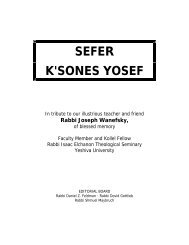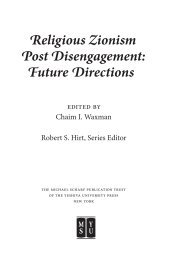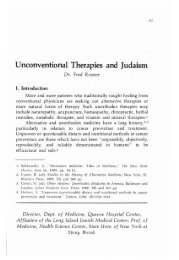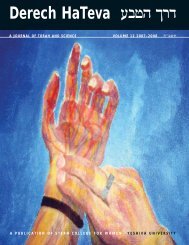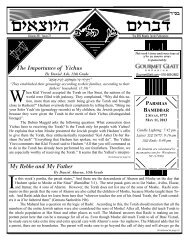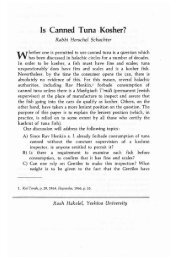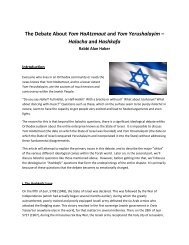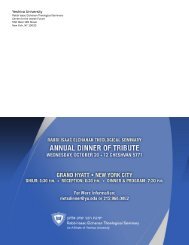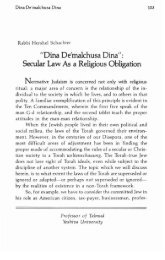yeshiva university • purim to-go • adar 5771 - YU Torah Online
yeshiva university • purim to-go • adar 5771 - YU Torah Online
yeshiva university • purim to-go • adar 5771 - YU Torah Online
- No tags were found...
You also want an ePaper? Increase the reach of your titles
YUMPU automatically turns print PDFs into web optimized ePapers that Google loves.
Purim the mitzvah of rejoicing involves drinking and getting drunk, on yom <strong>to</strong>v there is aprohibition against getting drunk 28 . Rabbi Soloveitchik 29 explained that what accounts for thesedifferences, is that the redemption on Purim was not complete.On Purim we begin learning about Pesach. On the one hand, Purim completes the message ofPesach. We learn <strong>to</strong> recognize the hand of G-d that was so clear in the miracles of Pesach in theordinary miracles that take place each and every day. We take the recognition of G-d’srevelation on Pesach <strong>to</strong> the next level, and see the “Pesach” in Purim. On the other hand, welook <strong>to</strong> redemption of Pesach and realize that the redemption on Purim was not complete, andthat we continue <strong>to</strong> be in a situation of incomplete redemption <strong>to</strong> this day. By internalizing themessage of Pesach and Purim, and using it <strong>to</strong> strengthen our belief in G-d through a recognitionof His hand in everything, may we merit the coming of the final, complete redemption; one thatwill be so great it will overshadow even the miracles of yetziat Mitzrayim.ומשתה ויום טוב" היינו שמחה לפני המשתה, שהרי חיוב השמחה שיש בפורים הוא חובת היום מתורת יום טוב, וגם לפניהמשתה יש חובת שמחה. אבל בשעת קבלה שלא קיבלו עליהן יום טוב, אלא משתה ושמחה, אם כן עיקר הדין שמחה שישבפורים, הוא לא חובת היום של פורים, שהוא יום שמחה, אלא שהוא דין במשתה של פורים, שצריך לעשות משתה שיש בושמחה, והיינו שקיום השמחה הוא בשעת המשתה, כלומר משתה שיש בו שמחה, ומשום הכי כתיב ימי "משתה ושמחה",משתה לפני השמחה, שהרי קיום השמחה הוא רק בשעת המשתה.28 רמב"ם הלכות מגילה וחנוכה פרק ב הלכה טוכיצד חובת סעודה זו שיאכל בשר ויתקן סעודה נאה כפי אשר תמצא ידו, ושותה יין עד שישתכר וירדם בשכרות.רמב"ם הלכות יום טוב פרק ו הלכה ככשאדם אוכל ושותה ושמח ברגל לא ימשך ביין מ ובשחוק ובקלות ראש ויאמר שכל מי שיוסיף בזה ירבה במצות שמחה,שהשכרות והשחוק הרבה וקלות הראש אינה שמחה אלא הוללות וסכלות ולא נצטוינו על ההוללות והסכלות אלא עלהשמחה שיש בה עבודת יוצר הכל שנאמר (דברים כ"ח) תחת אשר לא עבדת את ה' אלהיך בשמחה ובטוב לבב (מרב כל) האלמדת שהעבודה בשמחה,ואי אפשר לעבוד את השם לא מתוך שחוק ולא מתוך קלות ראש ולא מתוך שכרות.29Days of Deliverance, Rabbi Joseph B. Soloveitchik, “The Joy of Purim”What is strange is that we know the mitzvah of rejoicing is applicable not only <strong>to</strong> Purim, but <strong>to</strong> the Shalosh Regalim,the Three Pilgrimage Festivals, as well. Yet we have never come across a law or norm that would require a person <strong>to</strong>become drunk on Passover, Shavuot, or Sukkot. To the contrary, Maimonides emphasizes that we should not getdrunk on a festival…Take in<strong>to</strong> consideration Ahasuerus and his changing moods. He killed his beautiful queen at the suggestion ofMemucan, who was Haman (Megillah 12b). A few months later, he killed Haman at the suggestion of his new,beautiful queen, Esther. He was unstable. No one could be confident that the next day he would not demoteMordechai and appoint a new Haman. There was not sense of security. The miracle was incomplete. There washatzalah, salvation, but no ge’ullah, redemption.That which happened on Pesach and Shavuot changed the people. On Pesach, the bondman became a freeman.The people who were previously committed <strong>to</strong> the fleshpots of Egypt became an elected community, a covenantalcommunity. The same happened on Shavuot. On Sukkot, we portray the sojourn in the wilderness. Again, we arecelebrating the gradual change that came over the people… What happened on Pesach, Shavuot and Sukkot waspermanent. No galut, or exile, or political change; no Ahasuerus could undo what happened… What happened onPurim was not of permanent nature. They were saved, of course. However, no one could guarantee that the nextday the same s<strong>to</strong>ry would not repeat itself.Of course, we have <strong>to</strong> celebrate the miracle. But there is no guarantee, no security. That is why Hazal did notintroduce the concept of simhah as it was recommended by the <strong>Torah</strong> Vis-à-vis the Three Festivals. Rather, theyintroduced a different concept of simhah - gaiety, fun, which is just “acting” and is not sincere. The concept of lifneiHashem was not applied <strong>to</strong> Purim…The vic<strong>to</strong>ry is not final; the triumph is not decisive; a repetition possible. That is why we cannot equate thecelebration of Purim with simhat ha-regel, the joy of the Festival.36YESHIVA UNIVERSITY <strong>•</strong> PURIM TO-GO <strong>•</strong> ADAR <strong>5771</strong>



